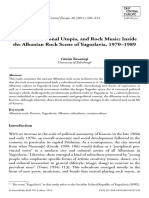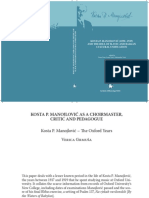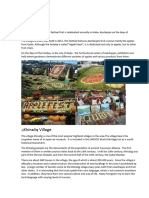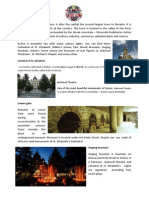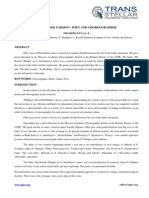Sarajevo Is The Capital and Largest City Of: Lonely Planet
Sarajevo Is The Capital and Largest City Of: Lonely Planet
Uploaded by
Adi ZahirovićCopyright:
Available Formats
Sarajevo Is The Capital and Largest City Of: Lonely Planet
Sarajevo Is The Capital and Largest City Of: Lonely Planet
Uploaded by
Adi ZahirovićOriginal Description:
Original Title
Copyright
Available Formats
Share this document
Did you find this document useful?
Is this content inappropriate?
Copyright:
Available Formats
Sarajevo Is The Capital and Largest City Of: Lonely Planet
Sarajevo Is The Capital and Largest City Of: Lonely Planet
Uploaded by
Adi ZahirovićCopyright:
Available Formats
Culture
Even though it“s a small country,Bosinia and Herzegovina has a rich culture which has affected and other Balcan
countries,and also the whole world.It is manifested through a lot of different areas of people activity
like:music,literature,films,art,design,media...Bosnia and Herzegovina is with Hunagry,the only country in the region,whitch
gave more then pne winner of Nobel prize:Vladimir Prelog for chemistry 1975. and Ivo Andrić 1961. for literature.There are
two Oscar winners and they are:Danis Tanović 2001. and Dušan Vukotić 1961.The first prizeman of American film
Academy,the prize „Oscar“,was born in Bosnia & Herzegovina,7 of February 1927. in Bileća.Dušan Vukotić (1927.-1998.),film
director,scenarist,droughtsman,animator,won an Oscar 1961. for short animated film „Surogat“ (Ersatz).
Sarajevo
Sarajevo is the capital and largest city of Bosnia and Herzegovina, with a population of 275,524 in its current administrative
limits. The Sarajevo metropolitan area, including Sarajevo Canton and East Sarajevo as well as some neighboring
municipalities is home to 555,210 inhabitants. Nestled within the greater Sarajevo valley of Bosnia, it is surrounded by
the Dinaric Alps and situated along the Miljacka River in the heart of Southeastern Europe and the Balkans.
Sarajevo is the leading political, social and cultural center of Bosnia and Herzegovina, a prominent center of culture in
the Balkans, with its region-wide influence in entertainment, media, fashion, and the arts.
The capital of Bosnia,Sarajevo,was a host of 14.th Winter Olympics,which were not only for converse of young sportists from
across the world,and for games of culture,piece and friendship. Sarajevo is sometimes called "Jerusalem Europe" or
"Jerusalem of the Balkans". It is the only major European city with a mosque, a Catholic church, an Orthodox church and a
synagogue within a hundred meters.
In 1885, Sarajevo was the first city in Europe and the second city in the world to have a full-time electric tram network
running through the city, following San Francisco. Sarajevo has been undergoing post-war reconstruction, and is the fastest
growing city in Bosnia and Herzegovina.The travel guide series, Lonely Planet, has named Sarajevo as the 43rd best city in
the world, and in December 2009 listed Sarajevo as one of the top ten cities to visit in 2010. In 2011, Sarajevo was
nominated to be the European Capital of Culture in 2014 and will be hosting the European Youth Olympic Festival in 2019.
Various modern buildings now occupy Sarajevo's skyline, most significantly the Bosmal City Center, BBI Centar, Sarajevo City
Center and the Avaz Twist Tower, which is the tallest skyscraper in the Balkans with 176 meters heights.
Music
Bosnian music has a long and famous history.Traditional music of Bosnia is a miscture of different Balcan effect,where are
the most different motives and gerne met.The most popular is yet “sevdalinka”,the love song od unique expression,which in
Bosina has a very long tradition.It is melodic,poetic and romantic,”sevdah” in Turkish means love.Bosina and Herzegovina
also has very popular pop and rock formations from ex-Yugoslavia,like:”Divlje Jagode”,”Bijelo dugme”,”Indeksi”,”Crvena
jabuka”,...
Literature
Bosnian literature is made up of many famous works. Ivo Andrić is the most significant representative of domestic literature
and the Nobel Prize winner of Literature in 1961 for "a complete literary description of a nation's history". The culmination
of this work was the novel "Na Drini ćuprija". At the top of literary creativity, the authors include: Meša Selimović (Dervis
and Death, Fortress), Isak Samoklija ... Among the poets of Bosnian origin, the most famous are Aleksa Šantić, but also Musa
Ćazim Ćatić, Antun Branko Šimić, Mehmedalija Mak Dizdar, Skender Kulenovic, Abdulah Sidran and many others.
Film
During the first two decades after the Second World War, films from Bosnia and Herzegovina covered the theme of the
National Revolution and War, including the famous and famous battles of partisans against foreign occupiers and domestic
traitors ("Kozara", "Sutjeska", "Battle of the Neretva" , "Valter brani Sarajevo"). However, the first real successes of the
domestic film were felt during the late 1970s and 1980s, when a special Bosnian film was created. The films have largely
covered social topics, as well as social criticisms of the socialist society. From 1995 until today, every year is regularly held
the Sarajevo Film Festival that grew up in the international film festival. Special attention to this festival is dedicated to films,
actors' talents and future projects from the area of South East Europe, attracting the attention of the international film
public. The Sarajevo Film Festival is also important in creating a common basis for the development of film industry
throughout the region while at the same time setting high standards in the festival organization, presentation and
popularization of film art in South East Europe.
You might also like
- Almost Maine Play AnalysisDocument3 pagesAlmost Maine Play AnalysisSantanaNo ratings yet
- That Funny Feeling ChordsDocument6 pagesThat Funny Feeling ChordsRaiza SarteNo ratings yet
- Bosnia and HerzegovinaDocument20 pagesBosnia and Herzegovinaedin naimkadicNo ratings yet
- History of Sibiu International Theatre FestivalDocument4 pagesHistory of Sibiu International Theatre FestivalLiliana LircaNo ratings yet
- Intervju: Bogdan Bogdanović (Eng)Document12 pagesIntervju: Bogdan Bogdanović (Eng)Kiša ErešNo ratings yet
- Moscow Prime Time: How the Soviet Union Built the Media Empire that Lost the Cultural Cold WarFrom EverandMoscow Prime Time: How the Soviet Union Built the Media Empire that Lost the Cultural Cold WarNo ratings yet
- Katalog Valjevo 2015enDocument28 pagesKatalog Valjevo 2015enfrubiNo ratings yet
- The Standing Stone of Medieval BosniaDocument3 pagesThe Standing Stone of Medieval BosniaAmila Omanovic100% (1)
- Postcard From Bosnia.Document16 pagesPostcard From Bosnia.viola156100% (1)
- Korça Is One of The Largest and Most Important Cultural and Economic Centers of AlbaniaDocument1 pageKorça Is One of The Largest and Most Important Cultural and Economic Centers of AlbaniaGliqeria PlasariNo ratings yet
- Sontag in SarajevoDocument3 pagesSontag in SarajevoFernandoLlorenteNo ratings yet
- Balkan Exhibitions From 2000.Document7 pagesBalkan Exhibitions From 2000.Hana KatanićNo ratings yet
- Our Home City VratsaDocument16 pagesOur Home City VratsaTsetsaNo ratings yet
- Dusan BatakovicDocument34 pagesDusan BatakovicRuža GolomejićNo ratings yet
- Socialism National Utopia and Rock MusicDocument19 pagesSocialism National Utopia and Rock MusicFurkan AcarNo ratings yet
- Julia Friedman CV 10.02.2010Document6 pagesJulia Friedman CV 10.02.2010juliafriedman69No ratings yet
- The Siege of Sarajevo: One Family’s Story of Separation, Struggle, and StrengthFrom EverandThe Siege of Sarajevo: One Family’s Story of Separation, Struggle, and StrengthRating: 5 out of 5 stars5/5 (2)
- Hypothetical Collaboration With Christo: and (Partially With) Jeanne-ClaudeDocument4 pagesHypothetical Collaboration With Christo: and (Partially With) Jeanne-ClaudeNedko BucevNo ratings yet
- Ivan Meštrović - EngleskiDocument10 pagesIvan Meštrović - Engleskic4t6f7zj78No ratings yet
- KOSTA P. MANOJLOVIĆ (1890-1949) and The Idea of Slavic and Balkan Cultural UnificationDocument16 pagesKOSTA P. MANOJLOVIĆ (1890-1949) and The Idea of Slavic and Balkan Cultural UnificationPetar DekicNo ratings yet
- Craiova History and Monuments: EssayDocument3 pagesCraiova History and Monuments: Essaymihai romanNo ratings yet
- Slovenia SiDocument2 pagesSlovenia SiSlovenian Webclassroom Topic ResourcesNo ratings yet
- Summer Art Festivals in Croatia New vs. Old: University of Arts in Belgrade Center For Interdisciplinary StudiesDocument29 pagesSummer Art Festivals in Croatia New vs. Old: University of Arts in Belgrade Center For Interdisciplinary StudiesNatasha KadinNo ratings yet
- Mongolia ArtDocument4 pagesMongolia ArtAmaraaZoyaNo ratings yet
- TourismDocument5 pagesTourismMarijaMarinkovaNo ratings yet
- Albanian and Serbian Minorities in Osijek - PrishtinaDocument17 pagesAlbanian and Serbian Minorities in Osijek - PrishtinaMich KuchNo ratings yet
- Miskovic Post-Ottoman Nostalgia in The YDocument15 pagesMiskovic Post-Ottoman Nostalgia in The YMirza Hasan CemanNo ratings yet
- Visuality and Identity 2Document3 pagesVisuality and Identity 2DoctorMesmerNo ratings yet
- Slavenko Terzić - Who Are The SerbsDocument2 pagesSlavenko Terzić - Who Are The Serbspomaj96450No ratings yet
- Katowice in Your PocketDocument88 pagesKatowice in Your PocketIn Your Pocket City Guides100% (7)
- Re-Contextualizing Entertainment in Interwar Culture in BelgradeDocument15 pagesRe-Contextualizing Entertainment in Interwar Culture in BelgradeАндрија КорлатNo ratings yet
- Sklad EEPAC 3cz PDFDocument138 pagesSklad EEPAC 3cz PDFVeselovskaNo ratings yet
- Eco TourDocument5 pagesEco TourfrixanfrxanNo ratings yet
- 147160887-Manevic-Ar-Deco #Document7 pages147160887-Manevic-Ar-Deco #Una DjordjevicNo ratings yet
- The National and University Library of Bosnia and Herzegovina From Shelling On 25/26th August 1992 Till ReconstructionDocument5 pagesThe National and University Library of Bosnia and Herzegovina From Shelling On 25/26th August 1992 Till ReconstructionMehbooba ElahiNo ratings yet
- 3rd July One Day Travel PlanDocument11 pages3rd July One Day Travel PlansuletoyranNo ratings yet
- Victorita Dutu Cv-Abaut MeDocument4 pagesVictorita Dutu Cv-Abaut MevictoritaNo ratings yet
- Catedral of St. Elisabeth: Lower GateDocument3 pagesCatedral of St. Elisabeth: Lower GateAnttiLuomaNo ratings yet
- Biography Ivo AndricDocument9 pagesBiography Ivo AndricenisaNo ratings yet
- About Ljubljana 2010Document2 pagesAbout Ljubljana 2010Slovenian Webclassroom Topic ResourcesNo ratings yet
- Vysloužil and Kocmanová, 1965Document15 pagesVysloužil and Kocmanová, 1965Meriç EsenNo ratings yet
- (Project Rastko) The HISTORY of SERBIAN CULTURE - Petar Marjanovic The TheatreDocument13 pages(Project Rastko) The HISTORY of SERBIAN CULTURE - Petar Marjanovic The TheatreNevena MrdjenovicNo ratings yet
- Visit - Sarajevo Eng Web PDFDocument32 pagesVisit - Sarajevo Eng Web PDFVasilisTourlidasNo ratings yet
- Culture of MoldovaDocument4 pagesCulture of MoldovaSilvia MirzaNo ratings yet
- The Organization of Uzbek Theater and DevelopmentDocument3 pagesThe Organization of Uzbek Theater and DevelopmentAcademic JournalNo ratings yet
- Alija Isaković - One of A KindDocument23 pagesAlija Isaković - One of A KindFaris Darman100% (1)
- The History of The Development of Cinema Art in UzbekistanDocument6 pagesThe History of The Development of Cinema Art in UzbekistanCentral Asian StudiesNo ratings yet
- ISSV: President's Annual Report 2019Document4 pagesISSV: President's Annual Report 2019Institute for Slovenian Studies of Victoria Inc.100% (2)
- Final ProgramDocument19 pagesFinal ProgramPavel PilchNo ratings yet
- Myroslav Shkandrij - Avant-Garde Art in Ukraine, 1910-1930 - Contested Memory-Academic Studies Press (2019)Document202 pagesMyroslav Shkandrij - Avant-Garde Art in Ukraine, 1910-1930 - Contested Memory-Academic Studies Press (2019)Niko HeinonenNo ratings yet
- The Moravian Folklore in Leoš Janaček's WorksDocument13 pagesThe Moravian Folklore in Leoš Janaček's WorksPreda-SchimekNo ratings yet
- Mirza CemanDocument4 pagesMirza Cemanmustafa_uzunalicNo ratings yet
- Non Touristy Side of MostarDocument2 pagesNon Touristy Side of MostarAnita KCKFNo ratings yet
- Edu Sci - IJESR - Dyusenbek Nakipov - ShankibayevaDocument2 pagesEdu Sci - IJESR - Dyusenbek Nakipov - ShankibayevaTJPRC PublicationsNo ratings yet
- Wander Through Bosnia and Herzegovina : Exploring Ancient Cities and Untouched NatureFrom EverandWander Through Bosnia and Herzegovina : Exploring Ancient Cities and Untouched NatureNo ratings yet
- Cities at War - The Case of ShushaDocument13 pagesCities at War - The Case of ShushaDjamel KhaznadjiNo ratings yet
- Balcanica 2014 PDFDocument496 pagesBalcanica 2014 PDFmilosevic77No ratings yet
- From The Other Side of The Ocean: Canada's Božidar Vidov and The Molise Croats of ItalyDocument25 pagesFrom The Other Side of The Ocean: Canada's Božidar Vidov and The Molise Croats of Italytaras_bNo ratings yet
- Popular Culture Identity and Soviet YoutDocument72 pagesPopular Culture Identity and Soviet YoutparaparcabanasNo ratings yet
- Power System Residential LoadsDocument9 pagesPower System Residential LoadsLMAOXDNo ratings yet
- Sight Sound 08 2017Document100 pagesSight Sound 08 2017mrebre100% (1)
- Internship-Report FB NguyenLeThienHoang 720H1451Document28 pagesInternship-Report FB NguyenLeThienHoang 720H1451Hoang TranNo ratings yet
- Much Ado About Nothing Comedy and TragedyDocument4 pagesMuch Ado About Nothing Comedy and TragedyXvalentina AmadoNo ratings yet
- Core Plans Swimming Lesson 2010 WinterDocument5 pagesCore Plans Swimming Lesson 2010 WinterJessica ZhaoNo ratings yet
- Thought Time and Musical TimeDocument12 pagesThought Time and Musical Timemonti9271564No ratings yet
- Body and Spain Todo Sobre My MadreDocument15 pagesBody and Spain Todo Sobre My MadreKathya Torres VargasNo ratings yet
- Empowerment Technology: Learning Activity SheetDocument35 pagesEmpowerment Technology: Learning Activity SheetShai LewishamNo ratings yet
- Passenger Report For Trip 319796Document5 pagesPassenger Report For Trip 319796el aloui mohamed saidNo ratings yet
- Principles of Exercise TrainingDocument13 pagesPrinciples of Exercise TrainingJanine Bisenio-Betchayda100% (1)
- Daftar Susunan Pemain: Karang Taruna KarangtengahDocument2 pagesDaftar Susunan Pemain: Karang Taruna KarangtengahskadaNo ratings yet
- MOON Protocol ACLDocument10 pagesMOON Protocol ACLthclaessNo ratings yet
- Norma de Competencia ExcavadoraDocument2 pagesNorma de Competencia ExcavadoraWilman33No ratings yet
- Capricho Catalan Op. 65 No. 5 From España - ISAAC ALBÉNIZ (1860-1909)Document4 pagesCapricho Catalan Op. 65 No. 5 From España - ISAAC ALBÉNIZ (1860-1909)Wei-Kai ShyuNo ratings yet
- Remotek Repeater FSR PDFDocument37 pagesRemotek Repeater FSR PDFjulienkoffi100% (1)
- Wheeler Winston Dixon Film NoirDocument209 pagesWheeler Winston Dixon Film Noirdanlack86% (7)
- Historic Centre of MacauDocument4 pagesHistoric Centre of MacauHarish GuptaNo ratings yet
- SITC, Rev.4 Level 5Document147 pagesSITC, Rev.4 Level 5Te TeNo ratings yet
- Kumpulan Lirik Lagu TerbaruDocument10 pagesKumpulan Lirik Lagu TerbaruLeLy NuryantiNo ratings yet
- Clavier Companion Vol.3 #4Document76 pagesClavier Companion Vol.3 #4Aaron Jessix100% (2)
- Match Fixing - Kevin Carpenter PDFDocument12 pagesMatch Fixing - Kevin Carpenter PDFAmogh PareekNo ratings yet
- 2 Practice Plans For KidsDocument3 pages2 Practice Plans For Kidsmishka123No ratings yet
- Emms, John - Concise Chess The Compact Guide For BeginnersDocument2 pagesEmms, John - Concise Chess The Compact Guide For BeginnersVanusha AdihettyNo ratings yet
- ZT-180 Install InstructionsDocument8 pagesZT-180 Install InstructionsplfmendesNo ratings yet
- William Shakespeare - WikipediaDocument12 pagesWilliam Shakespeare - WikipediaKst FamilyNo ratings yet
- 2012. Каталог Знаков Почтовой Оплаты Российской Федерации - 2012Document244 pages2012. Каталог Знаков Почтовой Оплаты Российской Федерации - 2012egorNo ratings yet
- English Year 6 SJKC Textbook KSSRDocument2 pagesEnglish Year 6 SJKC Textbook KSSRvasan67% (3)
- Ed Sheeran - Perfect Music Sheet & TAB PDFDocument2 pagesEd Sheeran - Perfect Music Sheet & TAB PDFErbinBlack100% (1)















